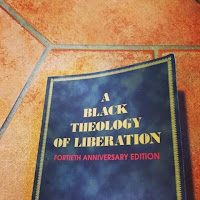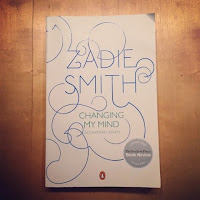Six weeks ago, after reading this post, I pledged to spend my Lenten season fasting from white media. This was daunting, because most media is white media. I am white, and so most of what I come into contact with is white. That's the nature of our world, today.
In the past six weeks, I have not stopped learning. And if you know me, you know that learning is my number one love. It has been exhausting and by no means exhaustive, but I have been changed. Here's how:
Reading
You, dear reader, know that reading is so dear to me. This seemed like the obvious foray into my Lenten fast. I decided that I would read only the words of people of color--books, blogs, news, poetry, journalism, you name it.
In the past six weeks, I have not stopped learning. And if you know me, you know that learning is my number one love. It has been exhausting and by no means exhaustive, but I have been changed. Here's how:
Reading
You, dear reader, know that reading is so dear to me. This seemed like the obvious foray into my Lenten fast. I decided that I would read only the words of people of color--books, blogs, news, poetry, journalism, you name it.
I started with Saeed Jones' newest poetry collection, Prelude to Bruise. If you're not familiar with Saeed, he used to be Buzzfeed's LGBTQ editor, but was recently crowned their literary editor. He's what's up. This collection was challenging to me--Saeed and I have not lived the same life, you know. Prelude to Bruise is bold and beautiful. If you're thumbing through it, I scribbled the most on "Ketamine & Company" and "Highway 407".
After I ripped through that poetry in a day and a half, I sat down to re-tackle a seminary textbook that I was assigned sections of and struggled with--A Black Theology of Liberation. James Cone does not mince words, y'all. I felt a lot more comfortable being uncomfortable hearing him, this time around. I've been getting better, the last few years, at understanding that the black church does not owe the white church any niceties. If you're a theology student, read this. If you're not, maybe don't start with this.
Fortunately for my Lenten discipline, the book we read at work in anticipation of this year's St. Augustine lecture was Holy Currencies. The Rev. Dr. Eric Law is an Episcopal priest, the son of Chinese immigrants, and the founder and executive director of the Kaleidoscope Institute--an organization committed to multiculturalism (not lip service to multiculturalism) in congregations and faith-based organizations. If you're a leader or a member or a neighbor, read it. He's also written six others, so check those out, too.
I am really bummed that I only read one book by a woman in this Lenten season, but I somehow only read four books. (Commence eye rolls, I know.) Zadie Smith, fortunately, is no small feat. This collection of essays, Changing My Mind, is appropriately subtitled "occasional essays" because it's an amalgam of things she wrote for a variety of publications on a variety of occasions. Some of them (the literary criticism) are hard to access; some of them (movie reviews) are laugh-out-loud-can't-underline-fast-enough hi-lar-ious. Read it, and her other books, as soon as you can get your hands on 'em.
Tweeting
Yes, twitter. It is its own category, because it is a crazmazing place for racial justice and racism and words and wounds to coalesce. I started the season by going through the list of users I follow (nearly 900 people, yikes) and unfollowing all the white men I couldn't remember why I followed. So. Many. White. Male. Journalists. I consider myself an informed member of the electorate, and so following a zillion political journalists is like, in line with that. But when an overwhelming majority of them are white men who write for the same-ish publications, that's not news. That's an echo chamber. So, goodbye those guys.
Next, I was fortunate to come across a list called something like "the best black journalists you should be following on twitter" or something seriously that specific. So I clicked, and clicked. As the #BlackLivesMatters movement has continued to grow, I have been following more activists and making sure that I get as much info from folks on the ground as I get from folks at 30 Rock. I also looked at who my favorite black voices were lifting up, and followed as instructed. It's been helpful. Do it.
You're expecting some handles, I can tell. My real entry into black twitter has come through the great people at Buzzfeed, so follow these people and everyone they tell you to follow: @theferocity @brokeymcpoverty @heavenrants @hayesbrown @aaronmedwards. Oh, and definitely follow @ismashfizzle even though she doesn't work there anymore.
Ayesha Sidiqqi is a Muslim woman who is fascinating and relentless in her pursuit of all things just and feminist. Follow her @pushinghoops.
If you scroll through #BlackLivesMatter you'll find some gems; I love following @deray @bdoulaonlongata @ReclaimHolyWeek (which may be less relevant now, but there's one every year, haha) @keenblackgirl, and everyone they interact with. You just have to dive in, I think.
Listening
This Lenten season invited me into the noughties (that's what Zadie Smith calls 2000-2009 and I'm so into it) via the world of podcasts. I tabled my NPR-or-bust lifestyle and sought out black, female voices in particular. [Sidebar that's maybe also the thesis: I noticed that black women's voices in particular were still the hardest to find in "mainstream" media sources.] Y'all, I have found black female excellence in podcast form.
Black Girls Talking is literally four black girls talking to each other. Alesia, Fatima, Aurelia, and Ramou spend an hour or so every couple weeks or so (if there's a rhyme and reason, I haven't figured it out yet) talking about what's happening in the culture around them. They are dedicated fans of black girl excellence on television--their "How to Get Away with Murder" and "Empire" recaps make it so I don't think I have to actually watch. Their takedown of the Jessica Williams imposter syndrome article lady was so informative to me about how white feminism does such a disservice to black women. I learn from them every episode.
On Call Your Girlfriend, Aminatou and Ann (50% black female excellence, 100% fantastic) chat from across the country about their jobs, the state of the world, feminism, and periods. They're long distance BFFs like me and most of my BFFs, which makes me feel great about them. They are unabashed women, which makes me feel great about them. If you like laughing about being an adult but not really being an adult, and learning about awesome feminist documentarians here and there, listen in.
A late addition to the game, but a new forever favorite is Another Round, hosted by Heben and Tracy, easily my favorite Buzzfeed ladies, easily the greatest combination of things that make black female excellence. They host other rad black women, Tracy tells corny jokes, they drink margaritas, they tell stories about what had happened...it's so good. You have to listen. They're only three episodes in, so you can easily join the club.
Oh, and Conversations about Conversations About Race should be on this list, too, even though it's also not exclusively black female excellence (it includes two dudes, one of whom is white) and is brand new. Their first episode came out last week, so they weren't necessarily part of my Lenten learning experience, but they're part of my lifetime of learning.
Watching
Tonight, #BlackGirlsRock was on BET. Fortunately, excellent black girls (@iSmashFizzle, for one) live in other time zones and so alerted me to what was going to be on my television a few hours later. I am so glad.
For the season of Lent, I have been increasing my consumption of media by people of color and black women in particular as best I can, and fasting from the redundant whiteness that appears in front of me. The Black Girls Rock Awards 2015 felt so appropriately like the Easter of that. It reminded and continued to teach me about the voices of black women who are overpowered by white/male voices in my everyday life.
Thanks be to God and to the amazing women (and men) of color who have carried me through on this journey. Certainly my Lenten discipline has ended, but it has opened my eyes. I have been changed by the experiences I have been privileged to read about and hear about these past six weeks.
Sure, I have still been immersed in whiteness, but I feel like I am noticing how white my world is in a different way, and intentionally replacing some of it. Not just tabling it until the end of Lent, either. I don't need to "catch up" on the things that I "missed." (Full disclosure, that was my original plan, and I had a handful of articles tabled to my Reading List for this moment. No more.)
This fast gave me an excuse to dive into the rich world of authors, filmmakers, journalists, musicians, politicians, theologians, and human persons who are all around me and yet whose voices I do not hear. I am listening, now. Are you?



